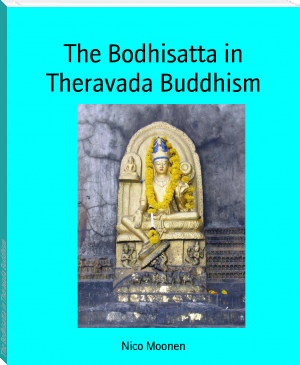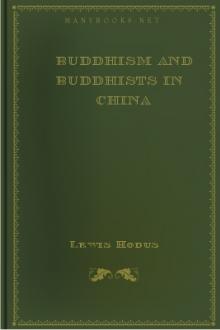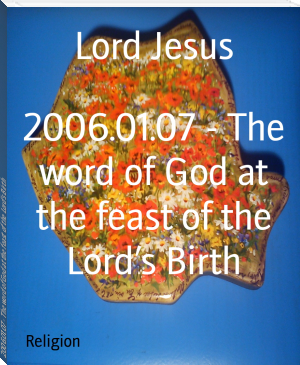The Bodhisatta in Theravada Buddhism by Nico Moonen (best books to read now .TXT) 📖

- Author: Nico Moonen
Book online «The Bodhisatta in Theravada Buddhism by Nico Moonen (best books to read now .TXT) 📖». Author Nico Moonen
The Sāvaka Bodhisatta will attain Enlightenment with the help of a teacher by following the teaching of a Buddha. He will be an Arahant, a perfect saint. Laymen, too, can become an Arahant! There is a little information available about the period of time that must be spent to become Arahant. But in the Satipatthana Sutta it is said that, if one practises insight-meditation for seven years, or even for a period of seven days, one may expect sainthood.[79]
The Pacceka Bodhisatta is one who will attain Enlightenment with his own effort, without any external help. But he will not be able to teach the Dhamma to others. To become a Paccekabuddha three factors must be present together: (1) an encounter with a living Buddha; (2) complete reverence; and (3) the will to become a Paccekabuddha.[80] According to the commentaries he will attain Enlightenment after fulfilling the ten normal and the ten higher perfections during two aeons and 100,000 world-periods (kappas).[81]
The Mahā Bodhisatta is the one who will attain Sammā-sambodhi, the supreme Enlightenment with his own effort, without the help of anybody else. He will be a Buddha, a Fully Enlightened One, and he will teach the Dhamma to gods and humans. This career is not recommended as an ideal higher than or alternative to Arahantship.[82]
All these types of Bodhisatta strive to attain Enlightenment. Everybody, without exception, can attain the highest Enlightenment. The difference between a Buddha, a Paccekabuddha and an Arahant is that the first two have insight into the truth by their own effort and an Arahant after having been taught.[83]
The Mahā Bodhisatta
A Mahā Bodhisatta (or in short: Bodhisatta) is someone who is destined for Buddhahood. He is sure to become a Buddha, a Fully Enlightened One, by his own efforts without being instructed by others.
Before the aspirant can begin his career, he has to make a mental resolve for Bodhisattahood and eventual Buddhahood. This mental resolve is made once only and does not need to be repeated. Secondly, he must make an aspiration in the presence of a succession of Buddhas in order to make known his intention of gaining Supreme Awakening. Thirdly, he has to perform some act of merit towards each Buddha as a pledge or guarantee of the deep seriousness of his purpose. Then each of these Buddhas must make a declaration to him that his aspiration will succeed. Buddhas can recognize a Buddha-to-be and can prognosticate about him.[84]
The combination of eight circumstances is essential for the success of the aspiration to Buddhahood. That aspiration succeeds only when the aspirant is in a human status and of the male sex. It does not succeed for women or for eunuchs, the sexless or hermaphrodites.[85] And only for a man who is endowed with a cause for attaining Arahantship does the aspiration succeed, but not for anyother.
If the aspiration is made in the presence of a living Buddha it succeeds. The aspiration does not succeed if made only near a stupa of a Buddha who has attained final Nibbāna, or only before an image at the root of a Bodhi-tree, or only in the presence of Pacceka-Buddhas or of disciples of Buddhas.
For one aspiring in the presence of a Buddha, the aspiration succeeds only for one who has gone forth among ascetics who promulgate the efficacy of kamma, or among monks, not for a householder. Only aspirants who have gone forth arrive at Self-Awakening, not those leading a household life. Therefore, in the beginning, at the time of making the aspiration, it is necessary to be one who has gone forth. Also, the aspiration succeeds only when he has obtained the eight attainments[86] and the five types of super-knowledge.[87] There is no success for one who has abandoned these attainments of the special qualities. The one aspiring to Buddhahood must also perform an act of merit: i.e. the sacrificing of oneself for Buddhas, even of ones own life. The aspiration succeeds only for one who has performed such an act of merit, not for others. In addition the aspirant to Buddhahood must have great will-power, great exertion and endeavour and must strive to attain these requirements leading to Buddhahood, that means resolutely practising the Perfections.[88]
In short, the career of the Bodhisatta begins with his making a formal resolution (abhinīhāra) to become a Buddha for the welfare of gods and men. Its ultimate realisation depends on fulfilling eight conditions: that the aspirant to Buddhahood (1) is a human being; (2) is a male; (3) is able to become an Arahant during the existence in which the resolution was made; (4) declares his resolution to a living Buddha who must predict to him that he in the future will be a Fully Enlightened One; (5) has abandoned the household life and has gone to ascetics who teach the doctrine on kamma, or lives with monks; (6) is able to attain to the states of meditation and has won the five supernormal knowledges; (7) is prepared to perform the required act of merit; (8) has great will-power and exerts himself to attain the perfections.[89]
The Bodhisatta does not perform hard tasks, nor does he go to an evil doom, nor does he work penance under alien teachers, of his own accord and free will.[90]
The Bodhisatta had teachers in worldly matters. But for piercing omniscient knowledge in the Dhamma, he had no instructor superior to himself.[91]
According to traditional belief, the Bodhisatta, before reaching his last birth as a Buddha on this earth, lives in the Tusita heaven, the Heaven of the Contented Ones. In that heaven the Bodhisatta investigates the following:[92]
The time of his birth.
The continent and the region where he will be born. (This is always India, in the Middle Country, Majjhimadesa).
The family into which he will be born (always either in a noble warrior family or a brahman family);
The mother (she is one to has fulfilled the perfections and kept the sīlas since she was born);
The life-span of his mother after conceiving him (ten lunar-months[93] and one week).
The month of his birth;
The time of the renunciation of worldly life.
The parents of Bodhisattas are determined, assured, fixed, arranged beforehand (in the past, i.e. before the Bodhisatta enters his last birth). The enlightenment tree is determined, the chief disciples are determined, the son is determined, the attendant is determined.[94]
The Bodhisatta stays in the Tusita heaven during the whole period that was allocated for him until the devas see that he will soon reach the end of his heavenly life span. The deities of the 10,000 worlds gather together and, clasping their hands, say to the Bodhisatta: "It is time for you, great hero, to arise in the womb of a mother. Helping men with the devas to cross over, may you awaken unto the undying state. Save the worlds with their devas and humans; find the territory of the Deathless.”[95]
Final Conception and Birth of the Bodhisatta
According to the Mahāpadāna Sutta the following rules apply at the conception and birth of the Bodhisatta in his last life when he finally attains Buddhahood: [96]
Mindful, clearly aware the Bodhisatta descends from the Tusita heaven into his mother’s womb.
When the Bodhisatta descends from the Tusita heaven into his mother’s womb, there appears in this world with its gods, Brahmas, Maras, and humans, a splendid light, surpassing the glory of the most powerful devas. And whatever dark spaces there are, such that they are not even reached by the mighty rays of sun and moon, these are illumined by this immeasurable splendid light. And those beings that have been reborn there, recognize each other by this light and know: “Other beings, too, have been born here!” And this tenthousandfold world-system trembles and quakes and is convulsed. And this immeasurable light shines forth.
When a Bodhisatta has entered his mother’s womb, four devas[97] come to protect him from the four quarters,[98] saying: “Let no man, no human being, nothing whatever harm this Bodhisatta or this Bodhisatta’s mother!”
When a Bodhisatta has entered his mother’s womb, his mother becomes by nature virtuous, refraining from taking life, from taking what is not given, from sexual misconduct, from lying speech, or from strong drink and sloth-producing drugs.[99]
When a Bodhisatta has entered his mother’s womb, she has no sexual thoughts connected with a man, and she cannot be overcome by any man with lustful thoughts.
When a Bodhisatta has entered his mother’s womb, she enjoys the fivefold pleasures of the senses[100] and takes delight, being endowed and possessed of them.
When a Bodhisatta has entered his mother’s womb, she has no sickness of any kind, she is at ease and without fatigue of body, and she can see the Bodhisatta inside her womb, complete with all his members and faculties.
Whereas other women carry the child in their womb for nine or ten lunar-months before giving birth, it is not so with the Bodhisatta’s mother, who carries him for exactly ten lunar-months before giving birth.
Whereas other women give birth sitting or lying down, it is not so with the Bodhisatta’s mother, who gives birth standing up.
When the Bodhisatta issues from his mother’s womb, devas welcome him first, and then humans.
When the Bodhisatta issues from his mother’s womb, he does not touch the earth. Four devas[101] receive him and place him before his mother, saying: “Rejoice, Your Majesty, a mighty son has been born to you!”
When the Bodhisatta issues from his mother’s womb, he issues forth stainless, not defiled by water, mucus, blood or any impurity, pure and spotless.
When the Bodhisatta issues forth from his mother’s womb, two streams of water appear from the sky, one cold, the other warm, with which they ritually wash the Bodhisatta and his mother.
As soon as he is born, the Bodhisatta takes a firm stance on both feet facing north, then takes seven strides and, under a white sunshade,[102] he scans the four quarters and then declares with a bull-like voice: “I am chief in the world, supreme in the world, eldest in the world. This is my last birth, there will be no more re-becoming.”[103]





Comments (0)